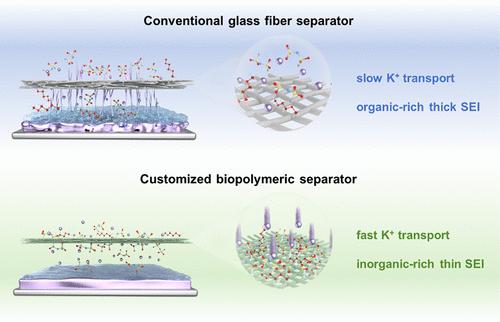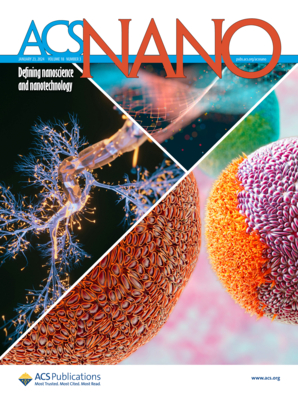A Thermally Robust Biopolymeric Separator Conveys K+ Transport and Interfacial Chemistry for Longevous Potassium Metal Batteries
IF 16
1区 材料科学
Q1 CHEMISTRY, MULTIDISCIPLINARY
引用次数: 0
Abstract
Potassium metal batteries (KMBs) hold promise for stationary energy storage with certain cost and resource merits. Nevertheless, their practicability is greatly handicapped by dendrite-related anodes, and the target design of specialized separators to boost anode safety is in its nascent stage. Here, we develop a thermally robust biopolymeric separator customized via a solvent-exchange and amino-siloxane decoration strategy to render durable and safe KMBs. Through experimental investigation and theoretical computation, we reveal that the optimized porosity and surface functionalization could manage ion transport and interfacial chemistry, thereby enabling efficient K+ diffusion and a favorable solid electrolyte interphase to achieve prolonged cycling stability (over 3000 h). The thus-assembled full cell retains 80% of its initial capacity after 400 cycles at 0.5 A g–1. The heat-proof property of the designed separator is further demonstrated. Our biopolymeric separator, affording multifunctional features, provides an appealing solution to circumvent instability and safety issues associated with potassium metal batteries.

热稳健的生物聚合物分离器传递K+传输和界面化学的长寿钾金属电池
金属钾电池具有一定的成本和资源优势,在固定式储能领域具有广阔的应用前景。然而,它们的实用性受到枝晶相关阳极的极大阻碍,而专门用于提高阳极安全性的分离器的目标设计尚处于初级阶段。在这里,我们通过溶剂交换和氨基硅氧烷装饰策略开发了一种热坚固的生物聚合物分离器,以提供耐用和安全的kmb。通过实验研究和理论计算,我们发现优化的孔隙率和表面功能化可以管理离子传输和界面化学,从而实现有效的K+扩散和有利的固体电解质界面相,从而实现长时间的循环稳定性(超过3000小时)。因此,在0.5 a g-1下循环400次后,组装的完整电池保持80%的初始容量。进一步验证了所设计分离器的耐热性能。我们的生物聚合物分离器具有多种功能,为避免与钾金属电池相关的不稳定性和安全性问题提供了一种有吸引力的解决方案。
本文章由计算机程序翻译,如有差异,请以英文原文为准。
求助全文
约1分钟内获得全文
求助全文
来源期刊

ACS Nano
工程技术-材料科学:综合
CiteScore
26.00
自引率
4.10%
发文量
1627
审稿时长
1.7 months
期刊介绍:
ACS Nano, published monthly, serves as an international forum for comprehensive articles on nanoscience and nanotechnology research at the intersections of chemistry, biology, materials science, physics, and engineering. The journal fosters communication among scientists in these communities, facilitating collaboration, new research opportunities, and advancements through discoveries. ACS Nano covers synthesis, assembly, characterization, theory, and simulation of nanostructures, nanobiotechnology, nanofabrication, methods and tools for nanoscience and nanotechnology, and self- and directed-assembly. Alongside original research articles, it offers thorough reviews, perspectives on cutting-edge research, and discussions envisioning the future of nanoscience and nanotechnology.
 求助内容:
求助内容: 应助结果提醒方式:
应助结果提醒方式:


